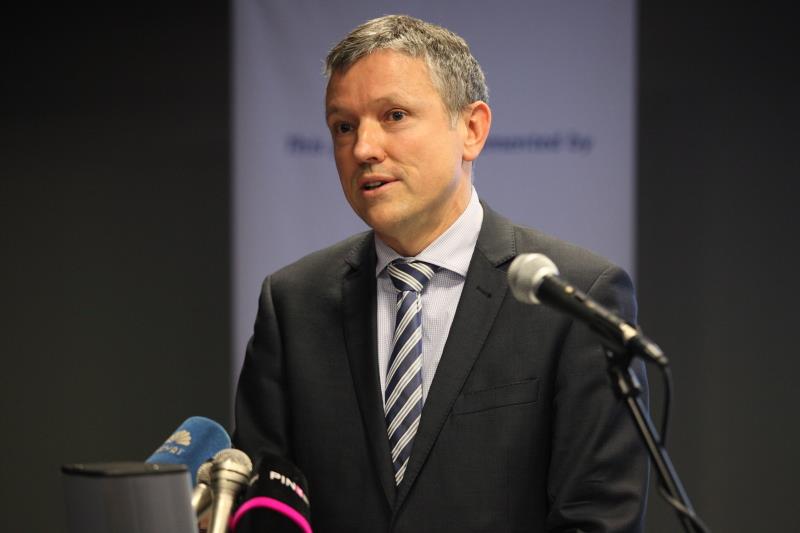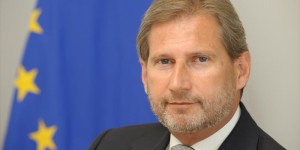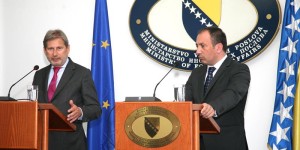25 April 2014, Sarajevo
Dear ladies and gentlemen,
It is a pleasure to be here with you today to mark the opening of this EU funded project. Its aim is to strengthen the capacities of institutions in Bosnia and Herzegovina to effectively implement Anti-Corruption Strategies and Action Plans, in cooperation with Civil Society Organisations.
The European Commission stated in its 2013 Progress Report that corruption remains widespread throughout the public and private sector in Bosnia and Herzegovina.
Two recent surveys carried out by the United Nations Office on Drugs and Crime (UNODC) and supported by the EU showed that 20,7 percent of the population in Bosnia and Herzegovina have paid a bribe last year. 3/4 of those who paid a bribe have paid one more than once. The average of a bribe is 220 BAM. Also a survey on Business, Corruption and Crime in Bosnia and Herzegovina in which almost 2000 companies were interviewed, estimated that 10,4 percent paid about 6-7 bribes last year, with an average cost of bribery is 318 BAM.
Corruption is of course a global phenomenon, and wherever it occurs, its negative impact on all spheres of life, economic and social development and the rule of law is evident. Citizens are paying a high price in the form of greater inequality, reduced growth and employment, and lack of political trust.
These concerns were rightfully at the heart of the recent protests.
In Bosnia and Herzegovina and elsewehere, tackling corruption requires joint efforts of a society as a whole. There needs to be genuine political will to fight corruption at all levels of government. Political actors need to ensure conditions that allow institutions and law enforcement agencies to implement the law without obstruction. The justice sector needs to be willing to tackle corruption in earnest, including taking on high-profile cases. Civil society and media need to act as a watch dog, and contribute to raising awareness for the negative effects of corruption. And last but not least, individuals need to be willing to expose and not to engage in corrupt behaviour in daily life.
The European Union is acknowledging that a weak rule of law and prevalence of corruption are among the main factors slowing down progress towards EU accession. These issues are therefore placed at the centre stage of the dialogue of the EU with the enlargement countries. This also applies to Bosnia and Herzegovina: Aspects of rule of law are discussed at the structured dialogue on justice, which will now be extended to also address anti-corruption.
And the EU backs up this political commitment and dialogue with projects in a number of areas which are relevant to the fight against corruption. We have made it a central element of our assistance to the law enforcement sector, we are providing grants to non-governmental organisations to tackle the issue, we are working to improve accountability within the judiciary, and we are supporting transparency in public administration reform and public financial management.
The support provided to the Anti-Corruption Agency and other institutions mandated to fight corruption is an integral part of the same effort.
A legal framework in place for the prevention and fight against corruption as well as the establishment of the Anti-corruption agency were key requirements during the visa dialogue. The EU assisted in the drafting of the first Anticorruption strategy and action plan. We supported the work of the Anticorruption agency through our technical assistance at its outset, and we are continuing to support it now.
BiH is today in a better position to fight corruption than it was two years ago. The Agency for Prevention of Corruption and Coordination of the Fight against Corruption has become operational.
Republika Srpska adopted its anticorruption strategy and it will soon have an action plan and monitoring bodies for the implementation of its Action Plan.
The Federation has put in place a network of coordinators to supervise the implementation of actions plans developed by some 50 public administrations and public entities. And a comprehensive legislative package to fight corruption and organised crime is in preparation.
Legislation of whistle-blower protection was adopted at the state level and is in parliamentary procedure in the Federation of BiH.
These steps are important and welcome! They are signs of a concrete commitment to fight corruption. But beyond the legislative and institutional measures I just mentioned, what ultimately matters are of course the results!
When developing the new Anti-Corruption Strategy and Action Plan under this project, both the ambition as well the feasibility of implementation and the capacity to make a real difference in practice need to be important guiding points. And for this, the support from both governments and civil society organisations will be crucial.
I call at this stage the relevant institutions represented at this event to fully engage in this effort, to contribute to the drafting work, and to demonstrate a level of commitment that is commensurate with the expectations of citizens in this country to see levels of corruption reduced.
And I equally call on the commitment of civil society organisations to make their important contribution to this joint effort: to advise on the contents of the strategy and action plan based on their experience and on how civil society can best contribute to its implementation.
There is no doubt that the role of civil society in this effort is indispensable: be it by ensuring public scrutiny, including exposing irregularities, or by highlighting successes in the fight against corruption achieved by individuals and institutions.
We are pleased to see that public institutions are starting to involve civil society organisation in their work to achieve the desired results – but believe that more can be done with regard to ensuring systematic consultation and dialogue. And of course, through this project, we would like to make a contribution to this process.
I wish the project team as well as all partners in this project success.
CHECK AGAINST DELIVERY




